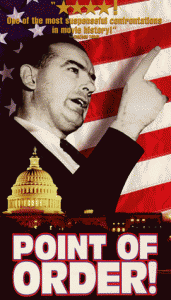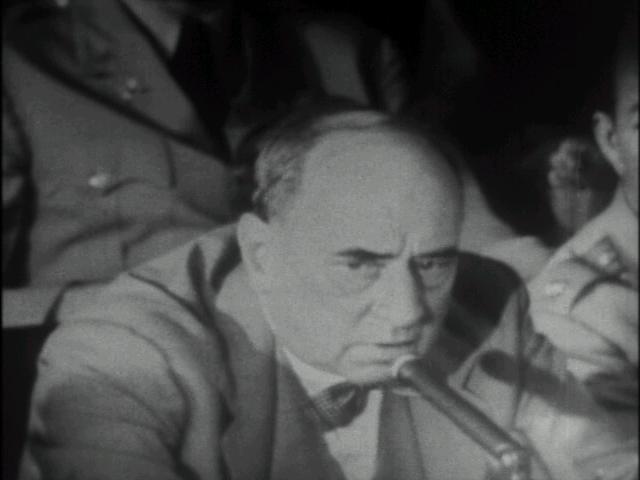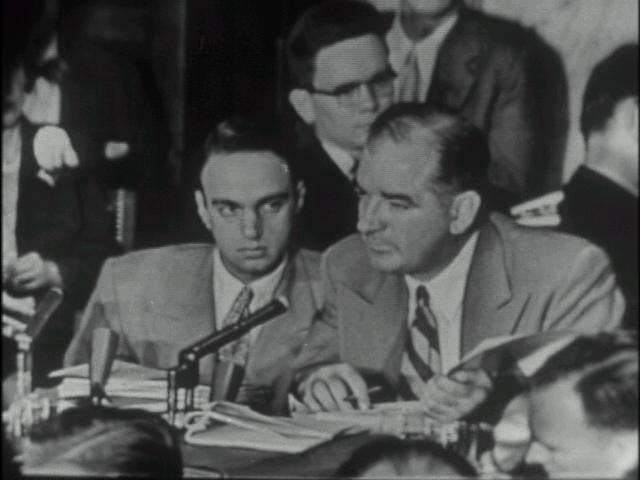“Apparently, Senator, you believe that anyone who disagrees with your point of view is a Communist.”
|

Synopsis:
Senator Joe McCarthy shows his true colors while standing on trial against the U.S. Army.
|
|
Genres, Themes, Actors, and Directors:
- Courtroom Drama
- Documentary
- Downward Spiral
- Emile de Antonio Films
- Political Corruption
Response to Peary’s Review:
Emile De Antonio took more than 180 hours of television footage from the 1954 Army-McCarthy hearings and crafted this fascinating glimpse at the crash and burn of America’s most infamous “Commie witch hunter”. As Peary notes, de Antonio offers us the “perversely satisfying” opportunity to “watch [Senator Joe] McCarthy sweat and squirm” while “being railroaded by military and political big shots” — all, notably, without the “voice of God” narration so common in documentaries at the time. Though there are some dry patches in the film (especially while various participants in the trial read all the way through certain documents), this is more than made up for by countless too-good-to-be-true moments of drama and hilarity. Especially compelling is Boston lawyer Joseph Welch, who sits “in a slouch with hand on chin and wearing a bow tie”; indeed, Welch displayed such genuine presence during the hearings that he was drafted by Otto Preminger to star as the judge in his courtroom drama Anatomy of a Murder (1959). De Antonio rightfully recognized that the true drama of the case lay not in its ostensible subject (whether McCarthy and his counsel, Roy Cohn, granted special favors to Pvt. G. David Schine), but in McCarthy’s spectacularly pigheaded behavior — the beginning of his final fall from grace. Point of Order remains a potent time capsule of this infamous event, and demonstrates de Antonio’s genius for crafting pre-existing footage into incisive political barbs. See also de Antonio’s Millhouse: A White House Comedy (1967) and In the Year of the Pig (1968).
Redeeming Qualities and Moments:
- Welch making his famous statement to McCarthy: “Have you no sense of decency, sir? At long last, have you left no sense of decency?”

- A fascinating time-capsule glimpse at one of the most famous court trials in American history

Must See?
Yes. This remains a pivotal film in documentary history.
Categories
Links:
|

2 thoughts on “Point of Order (1964)”
To me, this movie is one of the clearest windows into the fundamental problem with government: power attracts the worst kind of people, and brings out the worst in them. McCarthy was just your average ambitious junior senator until Roy Cohn suggested an issue that the senator could use to make a name for himself: reds. This film shows the end of McCarthy’s arc in and by his own words, and the editing is done so well that you feel as though you could argue with a historian by the end.
Also, when Welch lays into McCarthy in his now famous diatribe, you just want to stand up and cheer. In fact, those in the audience of the hearing applauded, a response that was not lost upon McCarthy or Cohn, who realized immediately that they were done.
An invaluable must!
To think, this footage was made out of, as director de Antonio says, “junk” that “had been lying around in a warehouse.” Imagine. And it was edited down from what went on for 8 hours a day for 36 days! – regardless of how much of it was actually televised.
What’s scariest is that at the root of it sits a self-hating homo (Cohn) causing a huge to-do over why the Army would not accommodate his (though who knows what was going on there) ‘boyfriend’.
(Laughter rises in the courtroom after the following exchange:
Adams, Counselor for the Army: “I asked him (Cohn) what would happen if Schine got overseas duty.”
Jenkins, Chief Counsel, Sub-Committee: “You mean you were breaking the news to him gently?”)
It’s instructive to hear so much double-speak between the participants (remembering, esp., that this is the ’50s). And it’s unnerving when, after being referred to as a “junior senator”, McCarthy repeats the reference to himself as “senator”. But then he trips himself up so often, one loses count.
Yes, the film belongs to “old-time lawyer” Welch – droll, and hilarious in his use of the English language: i.e., “I did not say that, Senator (McCarthy). I said that this purported copy did not come from the army files, and you know I’m quite right, sir. And I have an absorbing curiosity to know how in the dickens you got hold of it.” Welch’s ‘showdown’ with Cohn can be seen as the centerpiece, but his crowning moment has to be when McCarthy asks for a definition of a “pixie”: “I should say, Mr. Senator, that a pixie is a close relative of a fairy.” One is left to wonder if Welch was homophobic – under the circumstances, if he was, one minds a whole lot less.
Cross-references: ‘The Manchurian Candidate’, ‘Angels in America’, ‘Citizen Cohn’.